New Year, New Ideas
on Jan 18, 2018
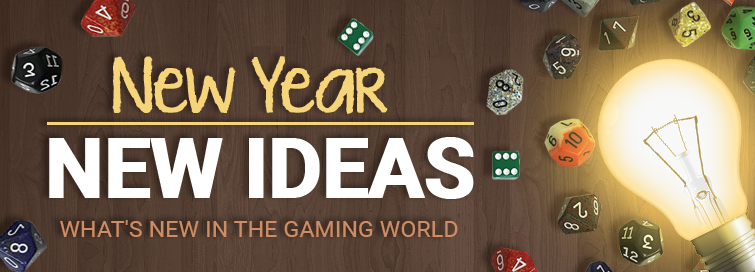
We're a couple of weeks into 2018, and the year is still all shiny and new. Traditionally, the beginning of a new year is all about renewal, making progress, and resolving to do things differently this time. In this spirit, our writer Jason suggested that we run a different sort of 2018 kick-off feature - rather than the "what are you looking forward to in the new year", he thought it would be a cool idea for us to spill some digital ink instead on what we feel are some of the more interesting and fresh things going on in the hobby gaming world right now. After I put the gold star on his sticker chart and offered him a congratulatory Capri-Sun, I put our team on the task. Here's to a new year and new ideas!
Michael Barnes
Review Corner Editor-in-Chief
Jason's Thoughts
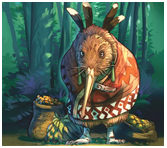 Most board games don’t explore broad thematic issues in any meaningful way. But they should try more often. Martin Wallace’s upcoming Moa promises to dig a little deeper, though at first blush you probably wouldn’t guess so. The premise is based on the British invasion and settlement of New Zealand. Alas, as colonization isn’t the most pleasant of subjects to simulate in a light, family-weight game, Wallace has turned to the animal kingdom. Players direct anthropomorphized bird tribes, representing the first Maori peoples to inhabit the islands, in a contest versus mammals, representing the invading Europeans. The major mechanism is area control, as shouldn’t surprise any fan of the veteran designer. However, the game’s not just about fighting and repelling interlopers. As true to actual events, you can also sell land to the mammals for your own profit and work with the enemy, much to the likely chagrin of your fellow tribes. You can also employ magic, because, well, it’s a game and let’s only take this historical stuff too far!
Most board games don’t explore broad thematic issues in any meaningful way. But they should try more often. Martin Wallace’s upcoming Moa promises to dig a little deeper, though at first blush you probably wouldn’t guess so. The premise is based on the British invasion and settlement of New Zealand. Alas, as colonization isn’t the most pleasant of subjects to simulate in a light, family-weight game, Wallace has turned to the animal kingdom. Players direct anthropomorphized bird tribes, representing the first Maori peoples to inhabit the islands, in a contest versus mammals, representing the invading Europeans. The major mechanism is area control, as shouldn’t surprise any fan of the veteran designer. However, the game’s not just about fighting and repelling interlopers. As true to actual events, you can also sell land to the mammals for your own profit and work with the enemy, much to the likely chagrin of your fellow tribes. You can also employ magic, because, well, it’s a game and let’s only take this historical stuff too far!
In any event, I have no idea if Wallace’s gaming allegory will hit its mark. But I certainly want to find out. The title promises to analyze how an environment is impacted by human struggle - and between two very disparate people groups, at that. Perhaps my expectations are too lofty? But just maybe it’ll strike a chord? If nothing else, it’s a fresh, unique and worthy effort at using board games to present a broader and meaningful message.
Michael's Thoughts
After a seemingly endless stream of overwrought, over-designed Kickstarter titles and any number of needlessly complicated post-worker placement games, I am ready for European family games to make another comeback- and there are rumblings that it could be happening in 2018. Knizia hit it out of the park in 2017 with his excellent, reductive deckbuilder Quest for El Dorado and Kiesling's Azul attracted a lot of attention for its simple, appealing gameplay as did Kingdomino. These designs are very reminiscent of the kinds of "German Games" that were popular during the late 1990s and early 2000s, games that offered lots of accessibility, visual appeal and charm without stretch goals, scads of components, and extended play times. I've loved the great reprints of classic games of this type, but I am hoping that in 2018 we see more designers pursuing a "less is more" approach and they bring us some fresh, new designs that bridge the gap between generations.
Drew's Thoughts
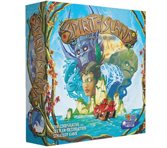 Since the breakout success of 1995's Catan, euro gamers have consistently explored and colonized other lands. Well, now it's the land's turn to fight back. In Spirit Island, players take control of ancient spirits who struggle to awaken and throw off the foreign invaders. You'll move, terrorize, and even kill the newcomers to dissuade them from making their presence permanent. Not only is Spirit Island thematically delightful, but it boasts a deep cooperative play which requires everyone at the table to be fully engaged and thinking about the best ways to accomplish their goals. For the New Year, I'd love to see more unique themes and more engaging plays.
Since the breakout success of 1995's Catan, euro gamers have consistently explored and colonized other lands. Well, now it's the land's turn to fight back. In Spirit Island, players take control of ancient spirits who struggle to awaken and throw off the foreign invaders. You'll move, terrorize, and even kill the newcomers to dissuade them from making their presence permanent. Not only is Spirit Island thematically delightful, but it boasts a deep cooperative play which requires everyone at the table to be fully engaged and thinking about the best ways to accomplish their goals. For the New Year, I'd love to see more unique themes and more engaging plays.
Grace's Thoughts
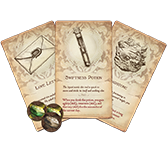 I've dabbled in RPGs over the years, but have never been able to commit to the polyhedral dice life. Legacy of Dragonholt combines a smattering of RPG flavor with a nostalgic love of Choose Your Own Adventure books. I created a character - complete with physical and personality traits, skills, and even a backstory - and set off on an adventure. The game itself consists of reading chunks of text and bouncing back and forth between pages in the included books. However, through it, a real story comes to life with decisions that have implications later and even experience points to spend on new skills. It's hard to really pin down if Legacy of Dragonholt is a board game, RPG, or just an excuse to buy a book in a box. It doesn't matter though as the narrative experience is incredibly impressive and immersive. Hopefully Legacy of Dragonholt blurring the lines between board and role playing games is part of a trend we'll see more of in 2018.
I've dabbled in RPGs over the years, but have never been able to commit to the polyhedral dice life. Legacy of Dragonholt combines a smattering of RPG flavor with a nostalgic love of Choose Your Own Adventure books. I created a character - complete with physical and personality traits, skills, and even a backstory - and set off on an adventure. The game itself consists of reading chunks of text and bouncing back and forth between pages in the included books. However, through it, a real story comes to life with decisions that have implications later and even experience points to spend on new skills. It's hard to really pin down if Legacy of Dragonholt is a board game, RPG, or just an excuse to buy a book in a box. It doesn't matter though as the narrative experience is incredibly impressive and immersive. Hopefully Legacy of Dragonholt blurring the lines between board and role playing games is part of a trend we'll see more of in 2018.
Kyle's Thoughts
Tabletop approximations of real-life escape rooms burst onto the scene over the past year, and the genre shows no signs of slowing down. From the Exit series to the Unlock games and everything in between, this category of games introduces a new kind of cooperative experience. While many co-op games can feel like a solitaire puzzle with the roles clumsily divvied up among the players, these games require true cooperation and teamwork. At the end of a scenario, players can look back on the shared experience and truly feel they contributed to the group's thought processes that helped them overcome the puzzles and challenges along the way.
When deckbuilding came on the scene, it was a few years before designers started to take note and design some fun alternatives to Dominion. Now, even the notoriously out-of-touch Reiner Knizia has jumped on board with his excellent SdJ nominee The Quest for El Dorado. In the same way, I'm confident that over the course of 2018 and beyond, we'll see some of the big-name designers and publishers put their own unique spin on the escape room genre. And even though I'm terrible at these games, I say bring it on.
Charlie's Thoughts
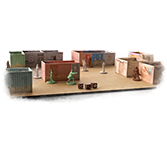 The licensed game has always been around. Historically they've sucked - who wants to play Judge Judy Monopoly or Hunger Games Life? Gale Force Nine of course brought respectability to the genre with the neo-classic Spartacus and it's been mostly roses since. Fantasy Flight Games' acquisition of the Star Wars license has added tremendous velocity to the momentum and we'll see more of this going forward.
The licensed game has always been around. Historically they've sucked - who wants to play Judge Judy Monopoly or Hunger Games Life? Gale Force Nine of course brought respectability to the genre with the neo-classic Spartacus and it's been mostly roses since. Fantasy Flight Games' acquisition of the Star Wars license has added tremendous velocity to the momentum and we'll see more of this going forward.
On the horizon we have the intriguing Firefly Adventures, The Walking Dead: No Sanctuary, Breaking Bad, and even a Blade Runner 2049 offering. Odds are that many of these will be solid and thoughtful designs. That's something we couldn't have said 5 years ago.
Pete's Thoughts
My game Seal Team Flix, which I co-designed with Mark Thomas, is coming out in 2018 from Wizkids and it is the freshest, dopest, illest, and most hype game of the year already. It will bring joy to children and cure the ailing.
Kidding aside (?), 2018 will be the year that I become a published designer so I'm very excited to see how players receive what I think is a cool new take on dexterity games. But other than my shameless shilling, I would really like to see more designs like Dice Forge and Mystic Vale that take fairly basic gameplay concepts and transform them into something far more interesting with physically modular components. It's such a cool idea, and I love to see creative designs like these.
Craig's Thoughts
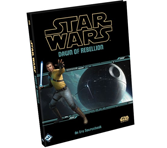 For me, 2018 will be the year of the RPG. As others have mentioned, several games have attempted the "RPG in a board game" feel, with two of my 2017 top three nearly delivering the magic of playing the star in your own story. While Near and Far brought an epic, open world experience, it still steered players toward VP collection at the end of every quest, at the expense of their dreams, and though Gloomhaven brought a massive amount of content to the table, along with its unique retirement mechanism, the vast majority of its gameplay still involved a WoW-like plow through enemies and loot grab. They were good experiences, but also highlighted for me why everyone's trying to replicate RPGs: they're the best way to create a personalized epic story. So I'm going back there this year, returning to a galaxy far, far away.
For me, 2018 will be the year of the RPG. As others have mentioned, several games have attempted the "RPG in a board game" feel, with two of my 2017 top three nearly delivering the magic of playing the star in your own story. While Near and Far brought an epic, open world experience, it still steered players toward VP collection at the end of every quest, at the expense of their dreams, and though Gloomhaven brought a massive amount of content to the table, along with its unique retirement mechanism, the vast majority of its gameplay still involved a WoW-like plow through enemies and loot grab. They were good experiences, but also highlighted for me why everyone's trying to replicate RPGs: they're the best way to create a personalized epic story. So I'm going back there this year, returning to a galaxy far, far away.
My RPG group is beginning a new quest, with me running the show as GM. Each player is creating their character by telling me their story, letting the narrative drive their stats and skills. We've come a long way from the Edge of the Empire beginner's game, and I can't wait to add all the info in the upcoming Dawn of Rebellion sourcebook to our adventure. What will happen? Who will live and who will die? It's all up to us. We have a whole galaxy to play with, and a rebellion to help, hinder or completely ignore. I've got a good feeling about this.

 Customer Support
Customer Support  Subscribe
Subscribe 




 Account
Account  Wishlist
Wishlist 
